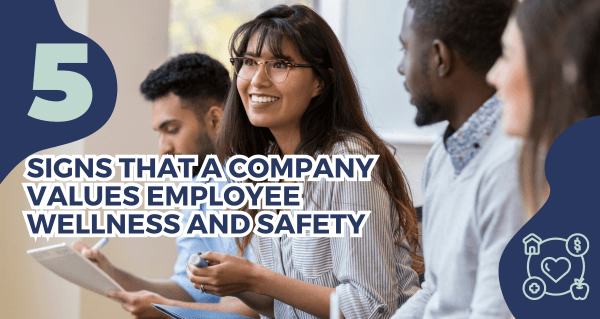
5 Signs That A Company Values Employee Wellness And Safety
When applying for jobs, there are many factors to take into consideration. Some of the common considerations include job responsibilities, opportunities for growth, salary, and location. An additional aspect that should be taken into account is whether the employer looks out for their employees. Are the employees at that company burnt out? Do they get sufficient time off?
Employee wellness and safety have become growing topics in many industries. It’s becoming increasingly important to employees that their company cares about their well-being. There are many incentives for employers to care – for example, healthy employees will need less time off for workplace injuries and illnesses, will be more productive, and will be happier in their roles. Positive team morale is incredibly important for a successful work team.
During the job application process, keep an eye out for the following five signs. Asking questions about these topics in your interview could give you insight into a company’s values when it comes to health and wellness.

This blog contains affiliate links, meaning I may receive a small commission (at no cost to you) if you subscribe or buy something through the links I share. I only share links to products or services that I use myself or absolutely love!
1 | Commitment From Management
At any company, the management needs to be fully committed to safety and wellness initiatives in order for them to succeed. Clear expectations for employee wellness need to be set by top management. It’s the higher-ups that have the authority to invest in resources and programs that support employee wellness and safety.
Not only do resources and initiatives trickle down from the top, but so does a company’s culture. It’s the responsibility of management to create a culture where employees know that their health and safety are valued and prioritized. If management doesn’t practice what they preach, that’s a bad sign.
2 | Employee Involvement
After management establishes these initiatives and values within the company culture, they need to communicate them to the team and get them involved. If employees are encouraged by their bosses to participate in wellness and safety programs, that’s a good sign. Employees should also feel that they have a voice in identifying and addressing safety hazards.
It’s important that employees feel comfortable reporting safety concerns to their supervisors without fear of retaliation. If an employee feels nervous about bringing management’s attention to a safety hazard, that is a major red flag. Employers who brush off safety concerns or retaliate against employees for reporting these concerns do not value health and safety in the workplace.
3 | Comprehensive Wellness Program
There are a few types of wellness programs that companies can establish for their teams. Some examples of wellness programs include yoga or fitness classes at the office, healthy snacks, financial counseling, wellness challenges, and flexible working hours. The more options that are included in the program, the better. The program also needs to be accessible and affordable.
Some companies offer a monthly wellness stipend that can go towards a gym membership, workout equipment for home, therapy, or another product or service related to wellness. This is a great way for employees to combat the physical and mental stresses from the workday on their company’s dime. It’s also a great way for employers to show their workers that they care.
All companies should tailor their wellness program to meet the needs of their team and their industry. Not all wellness programs are a good fit for employees, and it’s important for management to understand the needs of their team. This is another step in showing that employees are cared about and for.
4 | Strong Safety Culture
A company that has a strong safety culture based on trust, respect, and communication is key. Employees should be empowered to make safety decisions and report concerns. Conversely, employees should be held accountable for their own safety and the safety of others.
This is incredibly important in industries that involve physical labor, such as construction. These industries are heavily regulated by OSHA, the federal entity responsible for workplace safety. If a company ignores issues and violations, that’s a very bad sign. Some employers choose not to fix safety hazards for the sake of saving money or time, but this means they do not value employee safety.
5 | Continuous Improvement
A wellness initiative should not be created and then forgotten. Safety programs need to be continuously reviewed in order to identify areas for improvement. Especially as companies grow their teams, the needs of their employees will change.
Another good sign is if a company invests in new technologies and resources related to improving employee wellness. A company that keeps up with changing times and needs must value employee safety.
How to Assess These Factors
After reviewing the five signs outlined above, you may be wondering how to properly assess a company’s health and wellness initiatives. There are a few ways you can do this.
Research the company’s website and social media pages. Many companies publish information about their health and wellness initiatives, for potential candidates like yourself to see. Most companies value high employee retention and therefore want to make their workplace desirable. See if they have a recent blog or social media post showing what they do for their employees.
Ask during your interview. During the interview process is a great time to ask a variety of questions, including ones related to employee programs. Ask whether the company has wellness and safety initiatives, and see what they say. This should give you a clearer idea of how the company prioritizes its employees’ health.
Talk to current or former employees. Some job applicants like to gain more insight into a company by reaching out to current or former employees on LinkedIn. This can provide an unfiltered opinion on how the company really implements its programs.
There are great benefits to working for a company that values employee wellness and safety. If you are already employed, try evaluating your current employer’s health initiatives. This can guide you moving forward when making the important decision of where to work.
Related Articles
-
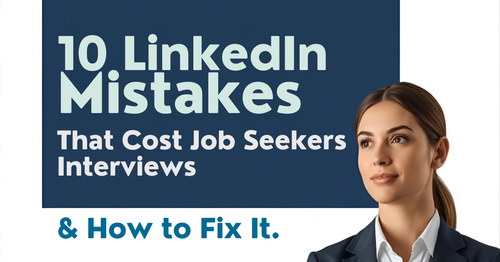
10 LinkedIn Mistakes That Cost Job Seekers Interviews (How to Fix It)
Guest blogger outlines how to avoid these LinkedIn mistakes to drastically improve your chances of being noticed, whether you’re actively job hunting or just trying to grow your professional presence.
-
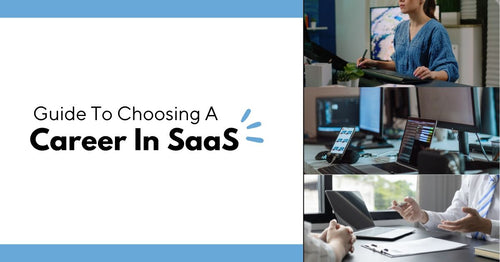
Guide To Choosing A Career In SaaS
Thinking about a career in SaaS? Guest blogger Jacob Wickett shares top roles, key skills, and how to break into this fast-growing industry.
-

Mastering the Modern Workplace: Essential Skills for Career Growth in the Age of AI
Guest blogger Sadie Smith shares a comprehensive guide to help professionals navigate unprecedented changes driven by technological advancement with confidence.
-

Navigating Your Career Path with a Family Nurse Practitioner Degree Program
Guest blogger Sadie Smith reveals how strategic planning in your healthcare career broadens your impact on patient care and community health.
-

Career Transitions: Navigating Your Path to Success in Healthcare and Beyond
Guest blogger Sadie Smith shares how to leverage your existing skills and experience while pursuing new career opportunities in healthcare and other industries.
-

Breaking Barriers: A Guide to Empowering Women in Manufacturing Leadership
Guest contributor Sadie Smith shares this comprehensive guide on how women can reshape the manufacturing industry landscape with actionable insights.
-

Navigating An Evolving Job Market With Strategies For Success
To thrive in a dynamic job market, you need to continuously adapt your job search strategies. Stay informed and flexible to position yourself for success.
-

4 Personal Assistant Interview Questions and Answers
Guest blogger Liza Griffen, co-founder of Tyler Griffen, equips you with a deep understanding of typical interview questions and practical answers to help you showcase your skills effectively whether you're aiming to impress in your first personal assistant role or looking to step up in your career.
-

Crack Your Dream Company Interview
Guest contributor Nandkishore Rathi shares practical tips, strategies, and insightful advice from career experts to help you shine during written and verbal interviews.
-
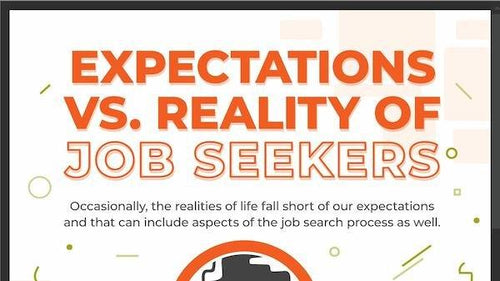
Exploring The Realities Of Job Hunting (Infographic)
Guest contributor Joseph Matalone delves into common expectations in job seeking and the contrasting realities.
-

Don't Panic: 15 Ways To Prepare For A Video Interview
Guest blogger Daniel Boyce with Aware Recruiter delves into 15 actionable steps to prepare you for a stellar video interview experience whether you're a seasoned professional or just stepping into the job market.
-

Can An Employer Fire You For Being Sick?
Many employers can terminate an employee for falling sick frequently. Guest blogger Natalie Padilla shares all you need to know regarding being fired by an employer.
-
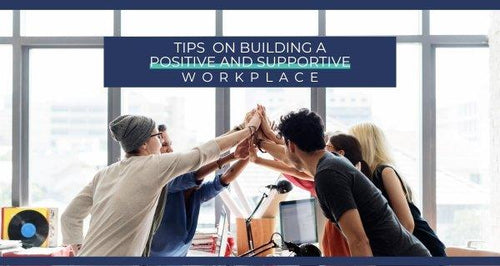
Tips On Building A Positive And Supportive Workplace
Guest blogger Adam Blacksmith shares how to embrace communication, celebrate diversity, and empower your team for success by fostering a positive and supportive workplace culture.
-

AI: Transforming Networking, Interviews, and Careers
Guest Author, Dean Fankhauiser. discusses how AI is revolutionizing networking, interviewing, career planning, and professional advancement.
-

Preparing for Different Interview Formats: Phone, Video, and In-Person
Interview Coach Ellie Hoekman shares specific preparation steps for phone, video, and in-person interviews.
-

Negotiating A Competitive Salary
Guest blogger Rohan Singh shares strategies for negotiating a fair salary that reflects your worth and fulfills your goals.
-

Can My Employer Ask Why I’m Taking A Sick Day?
Guest blogger Samantha Larson shares whether your employer has the right to ask you why you are sick and how much information they are entitled to when you take a sick day at work.
-

The Benefits of Coaching in the Workplace
Guest blogger, William Powell, shares some of the concrete examples of the benefits associated with employee coaching.
-

10 Facts & Stats About Sexual Harassment in the Workplace
Guest blogger Sharon Feldman shares how many people experience harassment every day, including at their place of work, to increase awareness.
-

The Ultimate Temping Guide for Beginners
Guest blogger Auria Heanley with Oriel Partners shares insight into what a temp job is and what to expect in order to make the most of a new job opportunity.
-

High Paying Career Paths After Learning Python
Guest blogger Rose Young with Codebasics.io shares some of the promising career paths you can explore after learning Python programming.
-

How To Ace Your Interview With A Staffing Agency
Guest blogger William Powell shares how to prepare adequately for an interview with a recruiting agency to increase your chances of landing your dream job.
-

How Do You Know When It's Time To Quit Your Job?
Guest blogger Katie Meyers shares when quitting your job is the right thing and how to go about it.
-

5 Things You Need To Know About Job Interviews To Succeed
Guest blogger Marcus Ralph shares 5 tips on what you can do before a job interview to be best prepared to make a solid first impression and land the job.

























